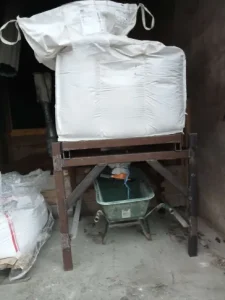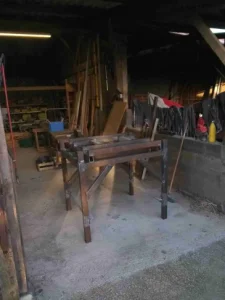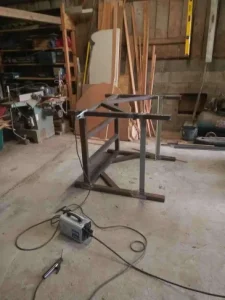The project
Context:
The “Village Forge” project began in the fall of 2021 with a diagnostic phase. The goal of this phase was to identify the specific needs for agricultural tools or food processing equipment among farmers in the targeted geographical area.
This initial stage of the project fostered connections with many individuals and collectives committed to healthy and sustainable food practices in Brittany. It also led to the establishment of a multi-artisanal workshop at the “Ferme des Petits Chapelais.” Finally, it facilitated the creation of a collective around the “Vilaine Fabrique,” with several members trained in metalwork and eager to professionally engage in the construction and repair of agricultural tools within the Vilaine Fabrique.
With this first phase of diagnostic and project setup concluded since early 2023, and given the positive reception of the “Village Forge” project by its future beneficiaries, the current objective is to produce these tools in the workshop and distribute them, along with the associated skills.
Main Issues Identified During Farm Visits:
- New tools for Living Soil Market Gardening: Emerging practices in living soil farming have created new tool requirements. Currently, there are few tools suited to these methods, paving the way for innovation in this area. The aim remains to ease the work of market gardeners while preserving soil health and biodiversity.
- Spreading organic matter in greenhouses: At present, market gardeners’ tractors are too large to fit inside greenhouses to spread manure. This task is therefore performed manually with wheelbarrows, making it extremely labor-intensive. A system needs to be developed to transport and spread manure inside greenhouses without excessive physical effort.
- Straw clearing and efficient planting: Living Soil Market Gardening is an environmentally friendly and productive cultivation method that is growing in popularity. Often, cultivated areas are covered with straw, adding an estimated two weeks of work annually. The goal is to create an ergonomic manual tool that can clear straw and allow for quick planting.
- Market gardening/nursery wheelbarrow: Current wheelbarrows for market gardening are expensive and not always tailored to farmers’ needs. The idea is to design and build customized, made-to-measure wheelbarrows.
- Broadfork (Grelinette): This essential tool for market gardening resembles a large fork and is used to aerate the soil without tilling, which helps preserve soil life. While broadforks are commercially available, they are often not durable and are manufactured thousands of kilometers away. The objective is to create a sturdy broadfork, adapted for demanding work, using as much reclaimed steel as possible.
Response Provided
Prototyping of Farmer Tools and Farm Equipment
During 2023–2024, several prototypes were initiated, and this request pertains to the continuation of prototyping, including improving existing tools and creating new ones, specifically:
- An improved version of a straw spreader
- Modular wheelbarrows for market gardening
- A small pedal-powered tractor with electric assistance (enhancing the model from “Atelier Paysan”)
- Offset row-marking rakes for seedbeds
- A manure spreader designed to fit under greenhouses
Impacts
The impact of the “Village Forge” project will be measured by the number of farms supported, the number of tools produced, and retrospectively, the utilization rate of these tools. This will be evaluated through a survey conducted with farmers approximately six months after they receive their new tools.
The production of agricultural tools also helps preserve and pass down increasingly rare artisanal practices. The association aims to document these skills, sustain them through practice, and share them. To this end, it organizes internal training sessions to ensure a high level of competence within the project team, and it also plans external training sessions, such as welding workshops.
Preserving craftsmanship provides useful, empowering, and more human- and environmentally-friendly professional activities.
Finally, the “Vilaine Fabrique” seeks to produce its systems using bio-based, reclaimed, or locally sourced materials whenever possible.
The Fondation setec is supporting this project with a grant of €19,881.
News
Last June, the association’s mentor, Lisa Wauters (setec invivo), had the opportunity to visit the association’s premises in Chavagne. The prototypes mentioned above were being tested on farms at the time, but she was able to observe the workers of the “Forge du Village” putting their know-how to good use to improve the comfort of local artisans. They were in fact building a prototype to lift and lower a dough mixer using a hydraulic cylinder for nearby bakers — with the goal of improving the ergonomics of their workspace.
“It was very interesting to visit their facilities and see both the wood and metal workshops, as well as the stock of recovered materials used to build their prototypes and allow members to work on their own tools.”
Even without the prototypes on-site, Lisa was able to see firsthand the benefits of the Foundation’s support for the association:
“I took photos of the equipment purchased thanks to the Foundation’s grant — such as the folding machine used to bend metal sheets, and safety equipment for workers, including an exhaust hood to capture metalwork fumes.”
“There was also a prototype of an ultra-light wheelbarrow that I tested — and it’s very practical!”
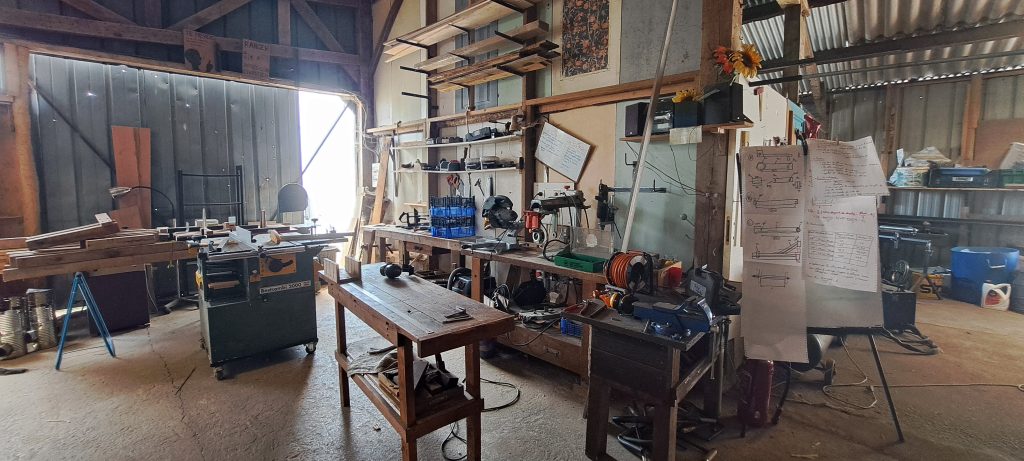
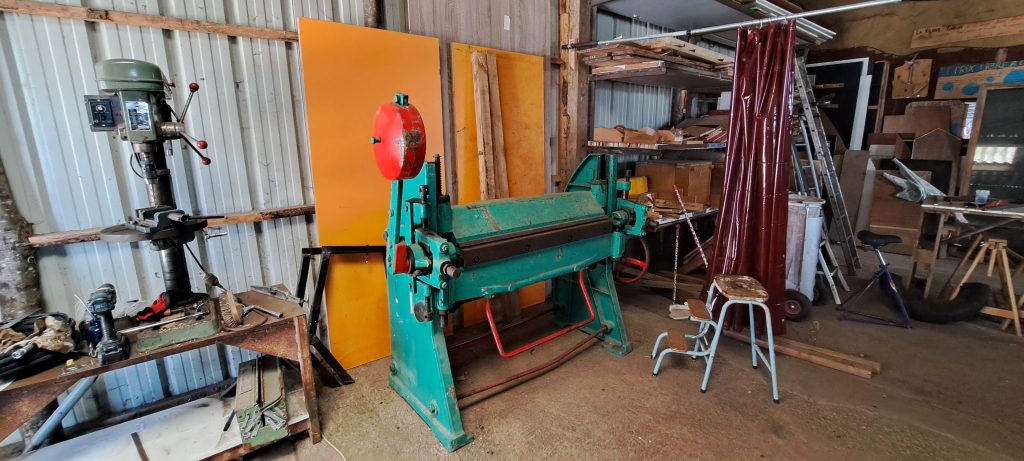
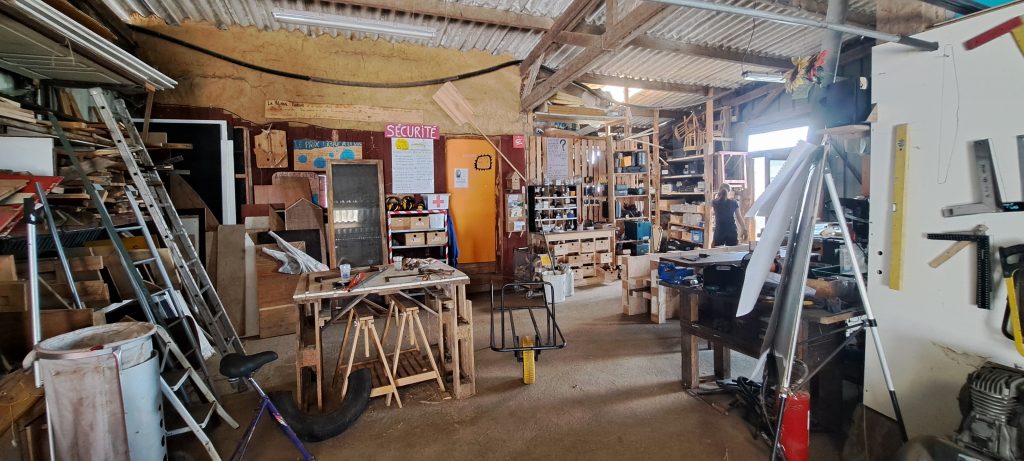
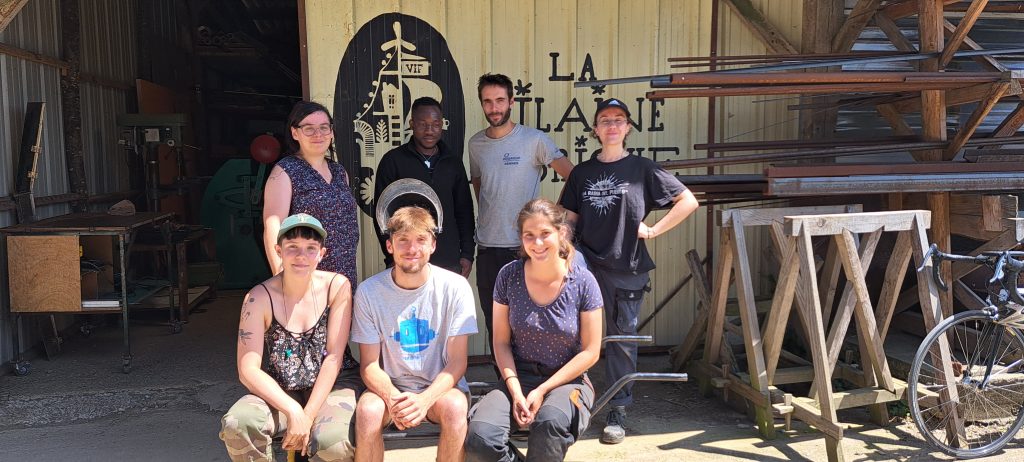
We thank Lisa for her involvement and for the beautiful photos, and the members of La Vilaine Fabrique for opening the doors of their workshop to us!
The setec Foundation continues to follow the progress of the project through the newsletter sent by the association, which you can find by sending an email : vilaine-fabrique@riseup.net .

